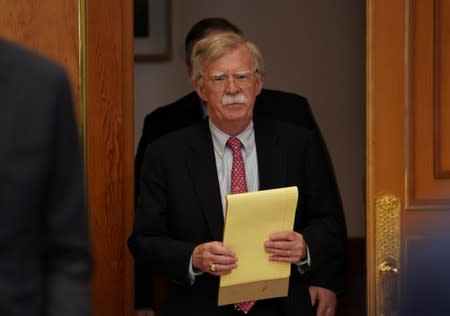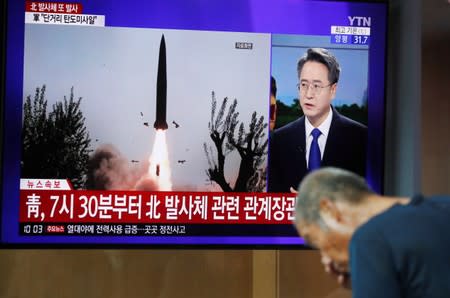Bolton reminds Kim of missile pledge after North Korea warns of 'new road'
By David Brunnstrom and Josh Smith
WASHINGTON/SEOUL (Reuters) - U.S. national security adviser John Bolton reminded North Korea on Tuesday of its leader's pledge to President Donald Trump not to resume launches of intercontinental-range missiles after Pyongyang conducted its fourth short-range missile test in less than two weeks and warned it might pursue "a new road."
Trump and his administration have played down the series of short-range tests since July 25 and on Tuesday U.S. Defence Secretary Mark Esper said the United States would not overreact and would keep the door open to talks.
Bolton told Fox News Channel the testing appeared aimed at getting the short-range missiles fully operational and Trump was keeping a close eye on developments.
"The president and Kim Jong Un have an understanding that Kim Jong Un is not going to launch longer range, intercontinental range ballistic missiles, and so I think the president is watching this very, very carefully."
North Korean leader Kim Jong Un said the launch of tactical guided missiles on Tuesday were a warning to the U.S. and South Korea's joint military drills, state media KCNA said.
North Korea fired short-range missiles into the sea off its east coast for the fourth time in less than two weeks on Tuesday, while criticizing the drills and deployment of high-tech weapons.
It has warned the drills could derail dialogue and of a possible end to its freeze of nuclear and long-range missile tests in place since 2017, which Trump has repeatedly held up as evidence of the success of more than a year of engagement with Kim.
North Korea's Foreign Ministry said on Tuesday it was committed to diplomacy and Pyongyang has given Washington until the year-end to soften its policy of sanctions and political pressure aimed at pressing Kim to give up his nuclear weapons and ballistic missile programs.
But a statement from its Foreign Ministry spokesman on Tuesday said the military drills violated a pledge by Trump to Kim and warned that if Washington and Seoul disregard its repeated warnings, "we will make them pay (a) heavy price."
Pyongyang "will be compelled to seek a new road as we have already indicated" if South Korea and the United States continue with hostile military moves, he added.
The missile tests have come in spite of a June 30 meeting between Kim and Trump at which they agreed to resume talks between working-level officials stalled since a failed second summit in Hanoi in February.
NORTH KOREA SEEKING CONCESSIONS
The talks have yet to resume and analysts believe the North Korean missile tests have been aimed both at improving military capabilities as well as at extracting more concessions, but Washington has shown no sign of budging on the key issue of sanctions relief.
South Korea's Joint Chiefs of Staff said the missiles launched on Tuesday flew about 450 km (280 miles) and reached an altitude of 37 km (23 miles), putting all of South Korea in range.
They were launched from the western part of North Korea, flew across the peninsula, and landed in the sea off the east coast, KCNA said, in what analysts said was showing North Korea's confidence in its missile technology.
South Korea's defence ministry said the launches went against the spirit of easing tension on the Korean peninsula.
"Part of what's happening now is that North Korea is expressing frustrations with a general lack of progress on inter-Korean agenda while increasing leverage in U.S.-North Korea negotiations by demonstrating how its programs could and will continue to advance," said Jenny Town, managing editor at 38 North, a website that tracks North Korea.
At a U.N.-sponsored Conference on Disarmament in Geneva on Tuesday, a North Korean diplomat accused Washington of "inciting military tension" by holding the joint exercises and warned that Pyongyang would have to "reconsider the major steps we have taken so far."
U.S. disarmament ambassador Robert Wood rejected the charge and said Washington was committed to denuclearization of North Korea as agreed by Trump and Kim at a first summit last year in Singapore.
"We very much look forward to returning to discussions with the North in order to carry out the vision laid out at that summit by President Trump and chairman Kim," he said.
Esper told reporters travelling with him to Japan the missiles launched on Tuesday were short-range ballistic types and he would discuss the North Korea issue with counterparts in Japan and South Korea.
"The key is to keep the door open for diplomacy ... we're not going to over react to these, but we monitor them, we watch them closely and we're cognizant of what's happening," the U.S. defence secretary added.
He said the current exercise with South Korea, known as Dong Maeng and largely computer simulated, was underway and at this point there was no plan to alter future joint military drills with South Korea.
A senior U.S. defence official, speaking on condition of anonymity, said the United States had not seen the progress from North Korea it would have liked and Pyongyang had not reciprocated Washington's gesture in suspending and altering a number of exercises over the past year.
(Reporting by David Brunnstrom and Mohammad Zargham in WASHINGTON; Idrees Ali in TOKYO, Josh Smith and Joyce Lee in SEOUL and Stephanie Nebehay in GENEVA; Editing by Susan Thomas and Sandra Maler)




